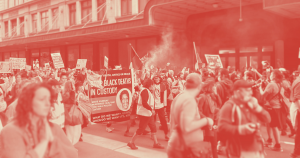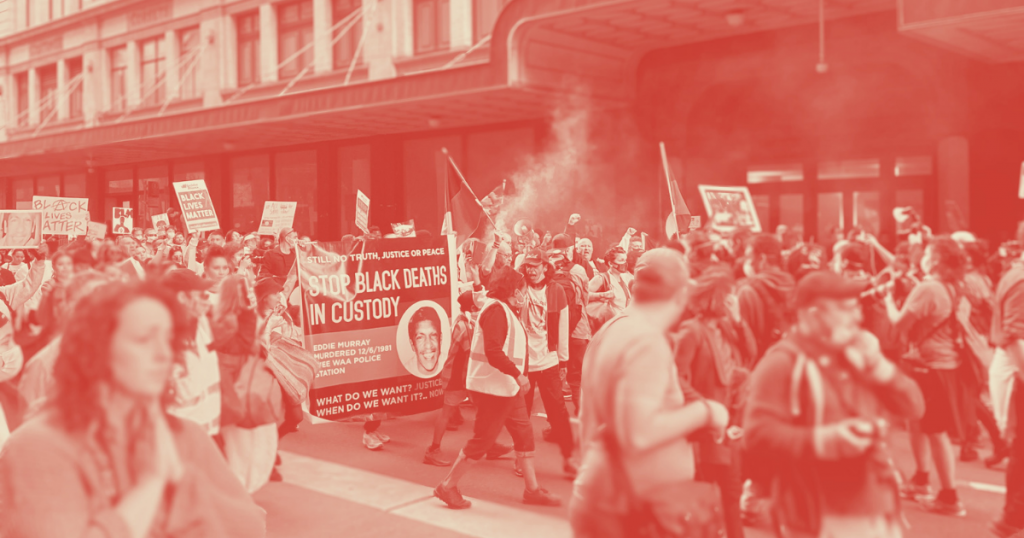On December 7, hearings will continue in the NSW Parliamentary inquiry examining the mass incarceration of Aboriginal people and the failure of the system in delivering justice for deaths in custody.
The inquiry is a direct result of the BLM protests that took place in June and July.
The delivery of justice is still lacking. Therefore, the protests cannot stop.
A protest will be taking place at 12 pm on Monday, December 7 at Djarrbarrgalli (the Domain) in Sydney.
Independent oversight body desperately needed
Many families who have lost loved ones in custody have already testified before the inquiry. A central demand is to establish a body completely independent of the police and prison guards (Corrective Services) to investigate deaths and refer those responsible for prosecution. This body should be controlled by First Nations people.
When police investigate police or prison officers it can lead to cover-ups, negligence and a lack of willingness to prosecute those responsible for deaths.
There has never been a successful prosecution of any police or prison officer responsible for an Aboriginal death in custody.
Australia’s first Indigenous silk Tony McAvoy SC told the inquiry earlier in the year that an independent Indigenous commissioner would work alongside coroners in investigations.
“If there is an independent investigation body established elsewhere that is a vast improvement on the current system,” he said.
“The coroner must be resources to do its job – that would mean resourcing the coroner’s court with the investigative powers to do the investigation independently.”
30 years on and still pushing for change
The Government in 1987 appointed the Royal Commission into Aboriginal Deaths in Custody. At this time, a First Nations person died in custody every 11 days.
The commission produced many reports. Those revealed that First Nations people were more likely to die in custody, partially because they were more likely to be in custody.
According to The Guardian, currently, First Nations people are still 10 times more likely to die in custody than non-Indigenous people in Australia.
From 2008 until March this year, 164 First Nations people have died in custody.
The Guardian pulled out just a handful of the 589 coronial reports from the Royal Commission to outline the systemic failures and neglect.
- An Aboriginal woman with a chronic injury and a tooth abscess was denied pain medication for six weeks after transfer to Townsville women’s prison in 2010. Her medical records did not arrive with her. Apart from issuing Panadol, authorities did not believe she was in need of pain relief. Six weeks after the transfer, she took her own life. The coroner said the pain was “a contributing factor in her despair” during her final weeks.
- An Aboriginal man in the grip of cardiac arrest was made to walk to a guard station to use a portable oxygen unit before authorities called an ambulance.
- Another Aboriginal man died of heart disease lying on a concrete bench in a Darwin police watch-house cell. The coroner said “a sick middle-aged Aboriginal man was treated like a criminal and incarcerated like a criminal; he died in a police cell which was built to house criminals … In my view, he was entitled to die as a free man.”
- And the well-known case of Mr Ward, a Ngaanyatjarra elder who the coroner found “cooked” to death in a prison transport van. He described the circumstances as “wholly unnecessary and avoidable”.
You can attend the protest (link here), share our blog, educate yourself on First Nations issues and promote #blacklivesstillmatter on social media.

Sarah is a civil solicitor who primarily practices in defamation, intentional torts against police, privacy and harassment.
- Sarah Gorehttps://obriensolicitors.com.au/author/sarahg/
- Sarah Gorehttps://obriensolicitors.com.au/author/sarahg/
- Sarah Gorehttps://obriensolicitors.com.au/author/sarahg/
- Sarah Gorehttps://obriensolicitors.com.au/author/sarahg/





